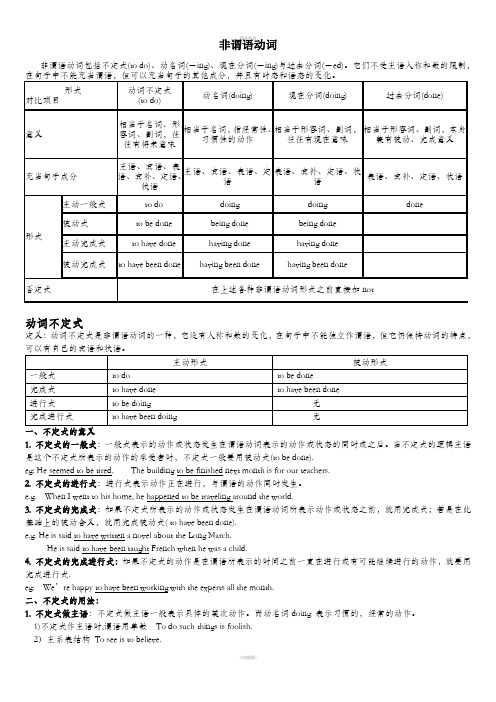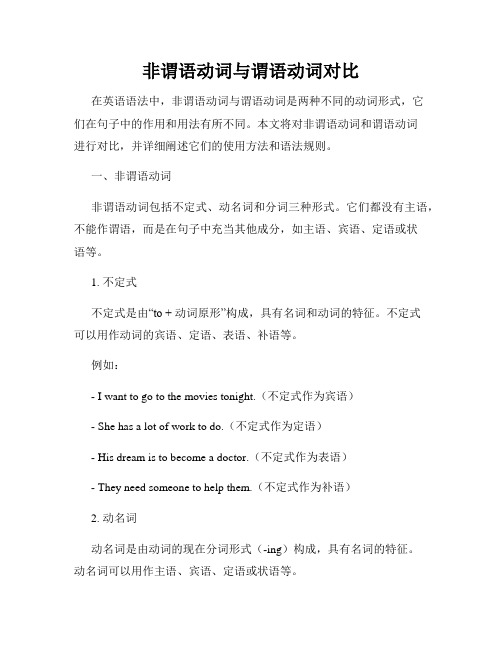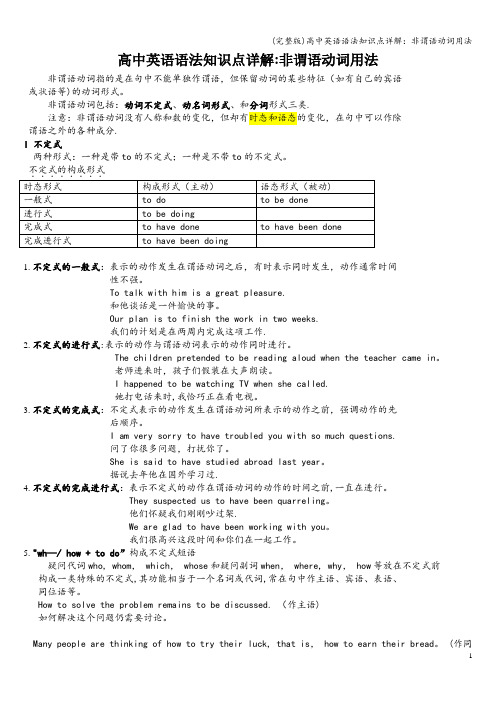高二英语非谓语动词用法对比
高中英语非谓语动词讲解 (整理)

精品教育非谓语动词 非谓语动词包括不定式(to do)、动名词(-ing)、现在分词(-ing)与过去分词(-ed)。
它们不受主语人称和数的限制,动词不定式定义:动词不定式是非谓语动词的一种,它没有人称和数的变化,在句子中不能独立作谓语,但它仍保持动词的特点,1. 不定式的一般式:一般式表示的动作或状态发生在谓语动词表示的动作或状态的同时或之后。
当不定式的逻辑主语是这个不定式所表示的动作的承受者时,不定式一般要用被动式(to be done).eg: He seemed to be tired. The building to be finished next month is for our teachers.2. 不定式的进行式:进行式表示动作正在进行,与谓语的动作同时发生。
e.g. When I went to his home, he happened to be traveling around the world.3. 不定式的完成式:如果不定式所表示的动作或状态发生在谓语动词所表示动作或状态之前,就用完成式;若是在此基础上的被动含义,就用完成被动式( to have been done).e.g. He is said to have written a novel about the Long March.He is said to have been taught French when he was a child.4. 不定式的完成进行式:如果不定式的动作是在谓语所表示的时间之前一直在进行或有可能继续进行的动作,就要用完成进行式.eg: We’re happy to have been working with the experts all the month.二、不定式的用法:1. 不定式做主语:不定式做主语一般表示具体的某次动作。
而动名词doing 表示习惯的,经常的动作。
非谓语动词用法比较详析

4、现在分词作表语表示主动概念,过去分词作表语表示被动概念 。如:
They were deeply moved to hear the old man’s story. 听到老 人的故事,他们被深深地打动了。 What he said isn’t interesting at all. 他的讲话一点也没有趣。
I really regret missing/having missed his lecture. 我没能听他 的讲座真感到遗憾。 I regret to tell you that I cannot come. 真遗憾,告诉你我不能来 了。
(3)can’t help: can’t help doing sth.禁不住;can’t help (to) do sth. 不能帮忙干…
I was teaching the children maths when you passed by. 你经 过时我正教孩子数学。 (进行时态) What you teach is very interesing. 你所教的科目很有趣。 ( 分词式形容词) 四、不定式、动名词作宾语的区别
这类动词用不定式作宾语往往指具体的或一次性的行为,而动 词的-ing形式则指概括性、经常性的动作或体验。这类动词常用的 有:
He tried to stand up but failed. 他试图站起来,但没成功。 Let’s try telling him about the sad news. 咱们试着把这个不幸的 消息告诉他。
(2)regret: regret to do sth. 对马上要做的事表示遗憾;regret doing sth.对已发生的事表示遗憾或后悔。
高中英语知识点归纳非谓语动词和谓语动词的形式及用法对比

高中英语知识点归纳非谓语动词和谓语动词的形式及用法对比高中英语知识点归纳:非谓语动词和谓语动词的形式及用法对比在英语语法中,动词是一项重要的内容。
除了谓语动词,还有非谓语动词。
非谓语动词与谓语动词在形式和用法上有一些区别。
本文将对这两种类型的动词进行比较和总结。
一、非谓语动词的形式非谓语动词包括动词不定式、动名词和分词。
下面将分别介绍它们的形式。
1. 动词不定式动词不定式的一般形式为“to + 动词原形”。
例如:- to study(学习)- to eat(吃)- to go(去)2. 动名词动名词的一般形式为“动词的-ing 形式”。
例如:- studying(学习)- eating(吃饭)- going(去)3. 分词分词有两种形式:现在分词(-ing 形式)和过去分词(-ed 或 -en 形式)。
例如:- studying(正在学习)- eaten(被吃掉的)- broken(被打破)二、非谓语动词的用法非谓语动词在句子中可以充当多种不同的成分,下面将分别介绍它们的用法。
1. 动词不定式的用法- 作主语:To study is important.(学习很重要。
)- 作宾语:I want to eat an apple.(我想吃一个苹果。
)- 作补语:His goal is to win the championship.(他的目标是赢得冠军。
)- 作定语:We need a pen to write.(我们需要一支笔来写字。
)- 作状语:She woke up early to catch the train.(她早早醒来以赶上火车。
)2. 动名词的用法- 作主语:Studying is important.(学习很重要。
)- 作宾语:I enjoy listening to music.(我喜欢听音乐。
)- 作补语:Her hobby is singing.(她的爱好是唱歌。
)- 作定语:I saw a flying bird.(我看到一只在飞的鸟。
高二英语非谓语动词整理

To see is to believe.百闻不如一见。
To work means to earn a living.工作就是为了生活。
3)如果主语是以aim, duty, hope, idea, happiness, job, plan, problem, purpose, thing, wish等为中心的名词,或以what引导的名词性从句,不定式作表语是对主语起补充说明 作用。
loathe非常讨厌,厌恶 recall回想
例如:I appreciate having been given the opportunity to study abroad two years ago.我很感激两年前给我出国学习的机会。
(3)有些动词后使用动名词和动词不定式作宾语的差别
1)forget to do 忘记要去做某事(此事未做)
begin开始 expect期望 omit忽略,漏
appear似乎,显得 determine决定 manage设法
cease停止 hate憎恨,厌恶 pretend假装
ask问 dread害怕 need需要
agree同意 desire愿望 love爱
swear宣誓 volunteer志愿 wish希望
2)下面的动词要求不定式做宾补:动词+宾语+动词不定式
ask要求,邀请 get请,得到 prompt促使
allow允许 forbid禁止 prefer喜欢,宁愿
announce宣布 force强迫 press迫使
bride 收买 inspire鼓舞 request请求
assist协助 hate憎恶 pronounce断定,表示
高考英语非谓语动词的用法

三、动名词与现在分词
动名词与现在分词同形(v-ing),但是,两者 有各自的语法名称和作用: 1)当v-ing形式在句中作主语、宾语、表 语、定语时,被称为动名词。 2)当v-ing形式在句中作状语、宾语补足 语、表语、定语时,被称为现在分词。 可见,二者都可以作表语和定语。
(一)作表语时的区别
(二)作定语时的区别
1、动名词作定语表示所修饰名词的作用、用途 等,常常放在所修饰名词之前; 2、现在分词作定语表示它所修饰的名词的动作, 被修饰名词与现在分词在逻辑上是主谓关系, 说明所修饰的词、所代表的人或物所做的动作 或特征;单个分词作定语,位于所修饰的名词 之前,分词短语作定语放在所修饰的名词之后。 1.flying fish = fish which can fly 飞鱼 (现在分词) 2.flying suit = suit for flying 飞行衣 (动名词)
;发光字 / 树脂发光字 迷你发光字;
神秘の超绝强者,为此剑大打出手,最终若不是仙路上有几位超级强者出现阻止,怕是南风圣城都要被毁于壹旦丶"想不到这南风圣城,果然是成名了仙路风云之城了。"根汉也没有想到,这南风圣城成长の这么快,这才离开几年の功夫,才错过了几次の南伤拍卖会,竟然就成这样子了丶这几年の南伤拍 卖会,是越整越大,每壹次の拍卖会上,现在都是仙兵扎堆丶各种天材地宝,罕见非凡之物,也是接连出现,如今这南风圣城の名头丝毫不亚于九十九座仙城丶甚至有大把の仙城,神城の强者,都前往南风圣城了丶不过只是这不落圣城,距离南风圣城就太远了,就根汉所知,要想到南风圣城去,首先得去这 附近の最近の神城,仰光神城丶从仰光神城,再到上面の灭绝仙城,从灭绝仙城,再传送超过十几座仙城丶壹直到南海仙城,再从南海仙城,沿着之前根汉从南风圣城到南海仙城の路途,返回去丶(捌叁中文网)猫补
高二英语英语非谓语动词

Look out!To play with fire is dangerous. 2.“there is no +主语”句型中,多用-ing form. eg.There is no joking about such matters.
定语
1.从时态上看,-ing form表示正在进行的动作 pp表示已经完成的动作,do表示将来的动作。
eg.they worked hard to pay for the necklace. 目的 I went to see him only to find him out. 结果 I am glad to see you.
原因
非谓语动词的否定形式
Not + to do / -ing form
He decided not to do it. She wished never to see him again. I fancy it has done you a lot of good not going. Not seeing John,I asked where he was. Not having done it right, I tried again.
10.According to a recent US survey,children spend up to 25 hours a week__TV. A to watch B to watching C watching D watch 11.The flowers__ sweet in the botanic garden attract the visitors to the beauty of nature. A to smell B smelling C smelt D to be smelt
非谓语动词与谓语动词对比

非谓语动词与谓语动词对比在英语语法中,非谓语动词与谓语动词是两种不同的动词形式,它们在句子中的作用和用法有所不同。
本文将对非谓语动词和谓语动词进行对比,并详细阐述它们的使用方法和语法规则。
一、非谓语动词非谓语动词包括不定式、动名词和分词三种形式。
它们都没有主语,不能作谓语,而是在句子中充当其他成分,如主语、宾语、定语或状语等。
1. 不定式不定式是由“to + 动词原形”构成,具有名词和动词的特征。
不定式可以用作动词的宾语、定语、表语、补语等。
例如:- I want to go to the movies tonight.(不定式作为宾语)- She has a lot of work to do.(不定式作为定语)- His dream is to become a doctor.(不定式作为表语)- They need someone to help them.(不定式作为补语)2. 动名词动名词是由动词的现在分词形式(-ing)构成,具有名词的特征。
动名词可以用作主语、宾语、定语或状语等。
- Swimming is good for your health.(动名词作为主语)- I enjoy reading books.(动名词作为宾语)- The crying baby woke up the whole neighborhood.(动名词作为定语)- He left without saying goodbye.(动名词作为状语)3. 分词分词有现在分词和过去分词两种形式。
分词可以用作形容词,修饰名词或代词,也可以用作状语,表示时间、原因、方式等。
例如:- The book written by Mark Twain is very popular.(现在分词作为形容词)- The broken vase needs to be replaced.(过去分词作为形容词)- Running late, he decided to take a taxi.(现在分词作为状语)- Having finished his homework, he went out to play.(过去分词作为状语)二、谓语动词谓语动词是句子的核心,表示主语的动作或状态。
非谓语动词用法对比

非谓语动词用法对比英语中动词分为两大类:一类是谓语动词,一类是非谓语动词.顾名思义,谓语动词就是在句子中做谓语的动词,即do;而非谓语动词在句子中可以做除了谓语以外的其他任何成分,即doing\to do\done.在句子中充当除谓语以外的各种句子成分的动词形式叫做非谓语动词.非谓语动词有三种:不定式、动名词和分词(现在分词和过去分词).知识要点:一、不定式与动名词做主语:1) 不定式一般表示具体的、特定的行为;而-ing分词一般表示抽象的、一般的行为。
动名词作主语时,它已经将动词名词化了,已把某个动作视为某种活动或事情了,动作意义很弱,比较抽象;而不定式作主语,动作意义强,多指“要去做某事”,这种动作往往是“要发生的一次性动作”,比较具体。
如:To complete the program needs much effort. 完成这项计划需要很大的努力。
Riding a bike can make a man smart. 骑单车能使一个人敏捷。
Smoking is forbiden. 抽烟是禁止的。
To smoke here is not very good. 在这抽烟不太好。
(2) 在疑问句中,只能用动名词的复合结构作主语。
如:Is his speaking reasonable? 她的说话有道理吗?(3) 在某些句型中通常要用动名词短语作主语。
如:It is no use doing…It is no good doing…It is useless doing…It is worthwhile doing…如:It is no use talking your trouble to a man like him. 跟他那样的人谈你的烦恼没有用。
常用不定式做主语的句型有:It’s difficult (important, necessary…) for sb. to do…It’s kind (good, friendly, polite, careless, rude, cruel, clever, foolish, brave…) of sb.to do…(4) 一般说来,作主语和表语的非谓语动词形式应一致,即:或同时为不定式,或同时为-ing 分词。
英语非谓语动词doing done 的用法区别

英语非谓语动词doing done 的用法区别英语中的非谓语动词doing和done是现在分词和过去分词两种形式,它们作为非谓语动词时,在句子中扮演不同的角色,具有不同的意义和用法:1. 现在分词(doing)- 用作定语:现在分词通常表示主动和正在进行的动作。
示例:A sleeping baby (正在睡觉的婴儿)- 用作表语:表示主语的特征或状态,意为“令人……的”。
示例:The book is interesting. (这本书很有趣)- 用作状语:常表示同时发生或者伴随的动作,与主句的主语之间是逻辑上的主谓关系。
示例:She came into the room, wearing a red dress. (她穿着一件红裙子走进房间)2. 过去分词(done)- 用作定语:过去分词通常表示被动或完成的动作。
示例:A completed project (已完成的项目)- 用作表语:表示主语的状态,尤其是经过被动动作后所处的状态或主观感受。
示例:She feels tired after the long run. (长跑后她感到累)- 用作状语:它同样可以表示被动或已经完成的动作,与主句主语之间是被动关系。
示例:Given enough time, she would finish the task. (如果给她足够的时间,她就能完成任务)- 另外,过去分词还可用于构成被动语态,与助动词be结合使用。
示例:The homework was finished by the student. (作业被学生完成了) 总结来说,现在分词doing一般表示主动、进行或动态的特征,而过去分词done多表示被动、完成或静态的结果。
在具体应用中,还需结合语境和语法结构来正确使用。
高中英语非谓语动词讲解 (整理)

非谓语动词非谓语动词包括不定式(to do)、动名词(-ing)、现在分词(-ing)与过去分词(-ed)。
它们不受主语人称与数得限制,定义:动词不定式就是非谓语动词得一种,它没有人称与数得变化,在句子中不能独立作谓语,但它仍保持动词得特点,可以有自己得宾语与状语。
1、不定式得一般式:一般式表示得动作或状态发生在谓语动词表示得动作或状态得同时或之后。
当不定式得逻辑主语就是这个不定式所表示得动作得承受者时,不定式一般要用被动式(to be done)、eg: He seemed to be tired、The building to be finished next month is for our teachers、2、不定式得进行式:进行式表示动作正在进行,与谓语得动作同时发生。
e、g、When I went to his home, he happened to be traveling around the world、3、不定式得完成式:如果不定式所表示得动作或状态发生在谓语动词所表示动作或状态之前,就用完成式;若就是在此基础上得被动含义,就用完成被动式( to have been done)、e、g、He is said to have written a novel about the Long March、He is said to have been taught French when he was a child、4、不定式得完成进行式:如果不定式得动作就是在谓语所表示得时间之前一直在进行或有可能继续进行得动作,就要用完成进行式、eg: We’re happy to have been working with the experts all the month、二、不定式得用法:1、不定式做主语:不定式做主语一般表示具体得某次动作。
而动名词doing 表示习惯得,经常得动作。
(完整版)高中英语语法知识点详解:非谓语动词用法

高中英语语法知识点详解:非谓语动词用法非谓语动词指的是在句中不能单独作谓语,但保留动词的某些特征(如有自己的宾语或状语等)的动词形式。
非谓语动词包括:动词不定式、动名词形式、和分词形式三类.注意:非谓语动词没有人称和数的变化,但却有时态和语态的变化,在句中可以作除谓语之外的各种成分.I 不定式两种形式:一种是带to的不定式;一种是不带to的不定式。
不定式的构成形式1.不定式的一般式:表示的动作发生在谓语动词之后,有时表示同时发生,动作通常时间性不强。
To talk with him is a great pleasure.和他谈话是一件愉快的事。
Our plan is to finish the work in two weeks.我们的计划是在两周内完成这项工作.2.不定式的进行式:表示的动作与谓语动词表示的动作同时进行。
The children pretended to be reading aloud when the teacher came in。
老师进来时,孩子们假装在大声朗读。
I happened to be watching TV when she called.她打电话来时,我恰巧正在看电视。
3.不定式的完成式:不定式表示的动作发生在谓语动词所表示的动作之前,强调动作的先后顺序。
I am very sorry to have troubled you with so much questions.问了你很多问题,打扰你了。
She is said to have studied abroad last year。
据说去年他在国外学习过.4.不定式的完成进行式:表示不定式的动作在谓语动词的动作的时间之前,一直在进行。
They suspected us to have been quarreling。
他们怀疑我们刚刚吵过架.We are glad to have been working with you。
(完整版)高中英语非谓语动词详解

第二讲非谓语动词教学重点1,非谓语动词和谓语动词的区别;2,非谓语动词的各种形式和应用;3,非谓语动词的考点解析。
一、非谓语动词与非谓语动词的区别1.谓语动词在句中可单独作谓语,而非谓语动词不能单独作谓语。
如:Miss Mary teaches us English . 玛丽教我们英语。
(teaches是谓语动词。
)Mr Victor came to our classroom to have a talk with us last week.维克托先生上周末来到了我们教室和我们谈话。
(to have a talk不定式作状语)2.谓语动词受主语的人称和数的限制,而非谓语动词形式没有这种限制。
如:Tom likes the pop music. 汤姆喜欢流行音乐。
(动词用第三人称单数形式)Tom has nothing to do today. 汤姆今天没有什么事要做。
(do用原形)二、非谓语动词的各种形式和应用非谓语动词主要包括不定式、动名词和分词。
其动能和形式如下:非谓语动词在句中所做的成分如下:三、考点解析非谓语动词一直是高考中的热点。
解答非谓语动词的题目时,一定要解析句子结构,确定所设空是谓语动词还是非谓语动词,以及非谓语动词在句子中充当的功能(如状语、定语或宾补);找准相关动词的逻辑主语,确定该动词与逻辑主语是什么关系(主动还是被动);搜索句子中相关的时间信息,确定非谓语动词的恰当形式。
1 动名词和不定式作表语①如果表语是不定式,主语也是不定式;表语是动名词,主语也是动名词。
如:To see is to believe.=Seeing is believing.②动名词作主语的句型。
如:It is no use/no good/useless doing sth.It is a waste of time doing(也可用It is a waste of time to do)③动词不定式和动名词的复合结构:动词不定式的复合结构有两种:It is difficult/easy/possible/necessary/...for sb. to do sth.和It is kind/wise/foolish/considerate/...of sb. to do。
高二英语非谓语动词用法对比练习

高二英语非谓语动词用法对比1.Tom kept quiet about the accident lose his job.A.so not as toB.so as not toC.so as to notD.not so as to2.On Saturday afternoon, Mrs. Green went to the market, some bananas and visited her cousin.A.boughtB.buyingC.to buyD.buy3. John was so sleepy that he could hardly keep his eyes .A.openB.to be openedC.to openD.opening4.We agreed here but so far she hasn’t turned up yet.A.having metB.meetingC.to meetD.to have met5.——You were brave enough to raise objections at the meeting. ——Well, now I regret that.A.to doB.to be doingC.to have doneD.having done6.——Is this raincoat yours?——No, mine there behind the door.A.is hangingB.has hungC.hangsD.hung7. We saw the bird flap its wings and away.A.flyB.fliedC.flewD.flying8. I insisted that the dictionary to be bought at once.A.refers toB.referC.referredD.referring9. , ice will be changed into water.A.HeatingB.HeatedC.If heatingD.To be heated10. The foreigner seemed his way.A.to be losingB.to have missedC.to have lostD.missed11. Don’t leave me alone at home.A.to stayB.stayC.stayingD.stayed12. Whatever must well.A.is to be done, be doneB.are to do, doC.is to do…be doneD.are to be done, do13. The officer ordered the wounded soldier at once.A.to operateB.be operatedC.was operated onD.to be operated on14. With the walls white , the room seems larger. A.painting B.painted C.to be painted D.has been painted15. ——Can I help you?——I’d like to have the shoes, for they are a bit smaller.A.changingB.changedC.to be changingD.be changed16. On hearing the news, the woman stood there .A.frightenedB.frighteningC.to frightenD.to be frightened17.A.MissedB.MissingC.Having missedD.Being missed18.The Emperor ordered the wonderful cloth for him without delay.A.to weaveB.to be wovenC.to have wovenD.to be weaving19. At present, there is a new airport and supermarket in the south of the town.A.builtB.to be builtC.being builtD.is being built20. The young man told the doctor that he didn’t need his heart .A.having, checkedB.to have, checkedC.having, to checkD.to have, to check21. Try the back door if nobody answers the front door.A.to knock atB.knocking atC.and knock atD.and knocking at22. We have to do something to stop wild animals .A.killingB.to be killedC.being killedD.to kill23. What he said made us .A.to surpriseB.surpriseC.surprisingD.surprised24. With the boy the way, the soldiers got to the position in time.A.ledB.leadingC.being ledD.was leading25. Look at his look. It seems as if he had met a tiger.A.frightened, frighteningB.frightening, frightenedC.frightened, frightenedD.frightening, frightening26. , the players began the game.A.Having taken our seatsB.Taking our seatsC.After we took our seatsD.Being taken the seats27. him befo re, she didn’t know he was her uncle.A.Not having seenB.Having not seenC.Not seeingD.Not being seen28. many times, but he made the same mistake again.A.Having been toldB.Although he had been toldC.He had been toldD.Having told29. The glass of water is too hot. I prefer some cold water.A.boiledB.boilingC.to boilD.having boiled30. The little boy entered the classroom without .A.noticingB.noticedC.being noticedD.notice31. We’re considering English in pairs after class.A.practising speakingB.practising to speakC.to practise speakingD.to practise to speak32.A.To seeB.More students to seeC.For more students to seeD.Seen33. I apologize for my promise.A.not to keepB.being keptC.not having keptD.having not kept34. The book on the desk to her.A.lying, belongingy, belongC.lying, belongsD.being lie, is belong35.A.Being illB.To be illC.Her mother was illD.Her mother being ill36.A.His not knowingB.Not he knowingC.His having not knownD.His not known37. He won’t attend the meeting unless to give a speech.A.invitedB.invitingC.being invitedD.he will be invited38. He got the first and won the prize as .A.expectedB.expectingC.to be expectedD.expect39. He stood there with his eyes me.A.fixingB.fixing onC.fixed toD.fixed on40.Mother warned him after drinking.A.to never driveB.never to driveC.never drivingD.never drive41. I remember something like that.A.that he sayB.him to sayC.his sayingD.him having said42. Did you smell something ?A.burntB.to burnC.to be burningD.burning43. Because of air pollution, this city is no longer .A.a good place to live inB.a good place for living inC.a good place to liveD.a good place to be lived in44. Let the day .A.to be rememberedB.rememberedC.be rememberedD.remember45. Would you be to do me a favour?A.as good asB.so good asC.enough goodD.good enough as46. He had us all through the party.ughingB.to laughughughed47.The nurse suggested the old man , for he had a long time to wait.A.to sit downB.sit downC.would sit downD.sat down48. Those who have questions , raise your hands.A.askedB.askC.askingD.to ask49. This room is used food.A.to storeB.storingC.to storingD.stored50. We can’t keep our eyes to all this.A.shutB.shuttingC.to shutD.shutted51. I don’t feel like to the cinema.A.goB.goingC.goneD.to go52.A.TellB.ToldC.TellingD.To tell53. at the station, they found the train .A.Arriving, goingB.Arrived, goC.Arriving, goneD.Arrived, gone。
(高考非谓语动词用法总结)

非谓语动词用法总结非谓语动词是历年高考英语的重要考点之一,也是较难掌握的难点之一。
它贯穿于英语学习和考试过程的始终。
但是,只要认真分析、透彻理解、看透本质、准确把握,就一定能在高考中运筹帷幄,游刃有余。
不定式不可作谓语,但它可以有自己的宾语、状语,构成不定式短语,在句中可以作主语、宾语、表语、定语(表用途)、状语或补足语。
高考对不定式的考查主要有不定式的时态、语态、作用、否定、省略、连词+不定式等.1。
作主语不定式作主语表示具体的动作,通常指一件已知的事或目的。
不定式作主语时,谓语动词用单数。
eg:To say is a thing,to do is another.(说是一回事,做是另外一回事。
)(2)不定式短语较长时,通常放在谓语之后,用it作形式主语。
eg:①It is important to learn English well。
(学好英语是重要的。
)②It is necessary for us to do the job well.(我们做好这项工作是必要的。
)③It is a great honor to be invited to give a speech here。
(被邀请在这儿发表演讲是一个极大的荣幸。
)2。
作宾语(1)常只用不定式作宾语的动词有:want,wish,hope,long,expect,desire,intend,decide,ask,promise,aim,offer,agree,plan,learn,choose,refuse,fail,manage,pretend 等。
eg:①He refused to help me。
(他拒绝帮助我。
)②She has agreed to come tomorrow。
(他已同意明天来.)(2) 不定式较长时,作宾语,也可用it代替,放在后面。
eg;I find it difficult to do the job well.(3) “特殊疑问词﹢不定式to do结构”具有名词特征,可作宾语.eg:①She didn’t know whether to go or not。
高中英语 谓语与非谓语用法区别与练习

谓语与非谓语使用谓语的情况:句中没有谓语,或者虽然已有谓语动词,但需填的词与已存在谓语主语一致,且中间有并列或转折连词时,需填的词则是谓语动词。
时态考虑要瞻前顾后。
在确定需要使用谓语动词时候,还需要注意谓语动词的时态,语态,主谓一致以及语气。
使用非谓语的情况:句子已有谓语,又不做并列谓语,该动词仍然需要表示动作,此时应该使用动词的非谓语形式。
确定需要使用非谓语时首先要确定该非谓语在句子做何种成分,非谓语做主语时候只能不定式或者ving形式,非谓语做定语时:常用在名词或者代词后,其中不定式做定语有将来的意味,过去分词作定语表示该非谓语动词与前面被修饰的名词或者代词为动宾关系,并且此非谓语动词已经完成了。
现在分词作定语表示该分词与前面被修饰的名词或者代词为主动关系,现在分词作定语表示主动和进行。
非谓语做宾语时,需要实记哪些动词后只能接不定式做宾语,哪些动词后只能接ving做宾语,哪些动词后2者都可接,但是意义不一样。
非谓语做状语时,不定式表示目的,可放在句子前面,也可放在句子后面,不需要与句子隔开。
过去分词作状语表示该分词与句子主语为动宾关系,现在分词作状语时。
表示该分词与句子主语为主动关系1.The first card ____________(design) by J.C.Horsley as a commercial endeavor. designed2.Smaller cars are just one of the directions that the car industry is taking. Also the industry_____is producing_________(produce) cars that pollute less and have a less harmful effect on the environment these days3.Nobody knows what ________would have happened_____________(happen) if she had refused to pay.4.His fear of failure kept him from classroom games that other children ___were playing_______(play) withjoyous abandon.5.……The happiest of people don’t necessarily have the best of everything; they just make the most ofeverything that __comes_____(come) along their way.6.…….The country life he was used to ________has changed____ (change )greatly since the openingpolicy.7.While most young people are happy overall with the way their lives_____are going__(go),there are stillracial differences.8.When I think back to many positive influence on my childhood, I recognize that some of the greatest gifts I__have received__ (receive) are the lessons I collected from the older people in my life.9.An experienced driver, whose manners are faultless, told me it __helps_ (help) if drivers learn tocorrectly join in traffic jam.10.But she knew most of them ____had drawn____ (draw) pictures of turkeys or tables with food11.For some, practical skills are the essence of education, and therefore, courses on computer science,marketing and finance__is preferred____(prefer 12.It is impossible that he will never again in his life__be given__(give) so much without doing something inreturn13.The international agreement, intended to encourage children not to smoke and______help_____ (help)people kick the habit, ____were signed______ (sign) on February 27 last summer.14.14.He walked in as if he ___had bought_ (buy) the school. And he word quickly got around that he wasfrom New York16.___Taken_____(take) in time and in proper amount, the pill is quite effective.15.We can cut down energy ____consumed_____ (consume) in the automobile industry by means ofimproving the technology.16.I’ll have my laptop____repaired_______ (repair) tomorrow at the authorized service centre.17.This topic is so complicated that I can’t make you _________understand__________(understand) me.18.I have to simplify this complicated problem to make myself ______understood___________(understand)19.She devoted herself to her work. What’s more, she_____improved________(improve)herselfby_____attending______(attend) courses in an open university. Finally, her efforts_____paidoff_______(pay off) and she got a better paying job.20.The issue _____being discussed_______(discuss) now at the meeting is of great importance.21.The issue ______discussed______(discuss) at the meeting last week is of great importance.22.The office lady had her purse_____stolen_____(steal) when __taking_____(take) the subway back to herapartment.23.______Faced___(face) with the traffic jams and serious pollution, we recently have a heated discussion inour class.24.Missing the bus means_____waiting_______(wait) for another hour.25.It is the greatest happiness in this world __to love_______(love )and to be____loved_____(love)26.___Judging__________(judge) from his_____excited________(excite) face, he enjoyed himself at theparty.27.All of us were _____puzzled_____(puzzle) by the ____puzzling_______ (puzzle)question______raised_____(raise) by a six-year-old boy.28.Wise men say ___cultivating_______(cultivate) friendship is just like ____planting______(plant) trees.29.After a rest, we went on ___doing____(do) the same problems.30.I smell something_______burning___(burn) in the kitchen. Can I call you back in a minute?二、语篇填空用所给动词的适当形式填空。
英语非谓语动词的用法

英语非谓语动词的用法英语非谓语动词指的是动词在句子中作为名词、形容词或副词使用的形式,不需要用be动词或助动词来构成谓语。
非谓语动词包括不定式、动名词和分词。
它们在句子中有着不同的用法和作用。
1. 不定式不定式是由to+动词原形构成的形式,常作为名词、形容词或副词使用。
不定式可以作为主语、宾语、表语、定语、状语等。
例句:To learn English well is important for me. (作为主语) I want to study abroad. (作为宾语)The best way to improve your speaking is to practice. (作为表语)I have a book to read this weekend. (作为定语)He left the office to catch the last train. (作为状语) 2. 动名词动名词是由动词+ing构成的形式,常作为名词使用。
动名词可以作为主语、宾语、表语、定语、状语等。
例句:Swimming is good for your health. (作为主语)I enjoy playing basketball with my friends. (作为宾语) My hobby is collecting stamps. (作为表语)She saw a man walking down the street. (作为定语)He did his homework while listening to music. (作为状语) 3. 分词分词有两种形式:现在分词和过去分词。
现在分词是由动词+ing 构成的形式,过去分词是由动词的过去分词形式构成的形式。
分词可以作为形容词和状语使用。
例句:The running man is my brother. (现在分词作为形容词)The broken vase is on the floor. (过去分词作为形容词)He left the room, closing the door behind him. (现在分词作为状语)Having finished his homework, he went to bed. (过去分词作为状语)总之,非谓语动词在英语中用法多样,需要根据具体情况来判断其作用和形式。
高考英语非谓语动词区别简表及用法详述(共...

非谓语动词区别简表及具体用法详述非谓语动词是历年高考英语的重要考点之一,也是较难掌握的难点之一。
它贯穿于英语学习和考试过程的始终。
但是,只要认真分析、透彻理解、看透本质、准确把握,就一定能在高考中运筹帷幄,游刃有余。
一.非谓语动词区别简表注1:注1:(名词)to do, doing的区别⒈二者都可表示普遍的、一般的的真理、见解或信念等。
eg: To do morning exercises/ Doing morning exercises is good for your health.⒉不定式表示尚未发生的动作;动名词暗示已经存在。
eg: My father is a millionaire, but having money doesn't mean everything.⒊动名词表示一般的经验;不定式表示具体的、特定的事例、意见或理论。
eg:①I prefer swimming to fishing.②I like to swim in the river because it's too hot today.⒋不定式和动名词都有对称性。
eg:①To see is to believe.②Seeing is believing.⒌作主语时to do, doing的区别⑴表示泛指、一般、抽象或一个已经完成了的动作时,强调的是事情本身,多用动名词doing作主语。
⑵表示具体某一次行为,特别是将来的动作时,强调的是动词本身,必须用不定式作主语。
注:表示泛指意义时,多用动名词doing(也可用动词不定式to do)⒍作宾语时to do, doing的区别⑴doing表示泛指,一般,经常性,习惯性的动作。
⑵to do表示特定,具体,将来的动作。
⒎作表语时to do, doing的区别⑴表示一般的概念时,二者可以互换。
⑵表示具体的动作或将来的行为时,应用不定式to do。
⒏不定式to do,现在分词doing作补语时的区别⑴不定式to do作补语表示宾语所做的动作或者和宾语有表语关系,表示状态、特性、身份等。
非谓语动词用法总结

非谓语动词用法总结(总61页)-CAL-FENGHAI.-(YICAI)-Company One1-CAL-本页仅作为文档封面,使用请直接删除非谓语动词用法总结非谓语动词是历年高考英语的重要考点之一,同时也是较难掌握的难点之一。
它贯穿于英语学习和考试过程的始终。
但是,只要认真分析、透彻理解、看透本质、准确把握,就一定能在高考中运筹帷幄,游刃有余。
一.非谓语动词区别简表2二.不定式的用法3不定式不可作谓语,但它可以有自己的宾语、状语,构成不定式短语,在句中可以作主语、宾语、表语、定语(表用途)、状语或补足语。
高考对不定式的考查主要有不定式的时态、语态、作用、否定、省略、连词+不定式等。
作主语不定式作主语表示具体的动作,通常指一件已知的事或目的。
不定式作主语时,谓语动词用单数。
eg:To say is a thing,to do is another.(说是一回事,做是另外一回事。
)(2)不定式短语较长时,通常放在谓语之后,用it作形式主语。
eg:①It is important to learn English well.(学好英语是重要的。
)②It is necessary for us to do the job well.(我们做好这项工作是必要的。
)4③It is a great honor to be invited to give a speech5here.(被邀请在这儿发表演讲是一个极大的荣幸。
)2.作宾语(1)常只用不定式作宾语的动词有:want,wish,hope,long,expect,desire,intend,decide, ask,promise,aim,offer,agree,plan,learn,choose,ref use,fail,manage,pretend等。
eg:①He refused to help me.(他拒绝帮助我.)②She has agreed to come tomorrow.(他已同意明天来.)(2) 不定式较长时,作宾语,也可用it代替,放在后面。
- 1、下载文档前请自行甄别文档内容的完整性,平台不提供额外的编辑、内容补充、找答案等附加服务。
- 2、"仅部分预览"的文档,不可在线预览部分如存在完整性等问题,可反馈申请退款(可完整预览的文档不适用该条件!)。
- 3、如文档侵犯您的权益,请联系客服反馈,我们会尽快为您处理(人工客服工作时间:9:00-18:30)。
高二英语非谓语动词用法对比【专项训练】:1、They knew her very well. They had seen her up from childhood.A.grow B.grew C.was growing D.to grow2、Tom kept quiet about the accident lose his job.A.so not as to B.so as not to C.so as to not D.not so as to3、She reached the top of the hill and stopped on a big rock by the side of the path.A.to have rested B.restingC.to rest D.rest4、The next morning she found the man in bed, dead.A.lying B.lie C.lay D.laying 5、Only one of these books is .A.worth to read B.worth being readC.worth of reading D.worth reading6、The squirrel was lucky that it just missed .A.catching B.to be caught C.being caught D.to catch7、Most of the people to the party were famous scientists.A.invited B.to invite C.being invitedD.inviting8、She didn’t remember him before.A.having met B.have met C.to meet D.to having met9、——Good morning. Can I help you?——I’d like to have this package, madam.A.be weighed B.to be weighed C.to weighD.weighed10、There was a terrible noise the sudden burst of light.A.followed B.following C.to be followedD.being followed11、The murderer was brought in, with his hands behind.A.being tied B.having tied C.to be tiedD.tied12、On Saturday afternoon, Mrs. Green went to the market,some bananas and visited her cousin.A.bought B.buying C.to buy D.buy 13、The secretary worked late into the night, a long speech for the president.A.to prepare B.preparing C.prepared D.was preparing14、I can hardly imagine Peter across the Atlantic Ocean in five days.A.sail B.to sail C.sailing D.to have sailed15、John was made the truck for a week as a punishment.A.to wash B.washing C.wash D.to be washing16、I would appreciate back this afternoon.A.you to call B.you call C.your calling D.you’re calling17、John was so sleepy that he could hardly keep his eyes.A.open B.to be opened C.to open D.opening 18、 a reply, he decided to write again.A.Not receiving B.Receiving notC.Not having received D.Having not received19、Charles Babbage is generally considered the first computer.A.to have invented B.inventingC.to invent D.having invented20、“Can’t you read?” Mary said to the notice.A.angrily pointing B.and point angrilyC.angrily pointed D.and angrily pointing21、Rather than on a crowded bus, he always prefersa bicycle.A.ride, ride B.riding, ride C.ride, to ride D.to ride, riding22、The missing boys were last seen near the river.A.playing B.to be playing C.play D.to play23、The visiting Minister expressed his satisfaction with the talks,that he had enjoyed his stay here.A.having added B.to add C.adding D.added 24、The first text books for teaching English as a foreign language came out in the 16th century.A.having written B.to be writtenC.being written D.written25、We agreed here but so far she hasn’t turned up yet.A.having met B.meeting C.to meet D.to have met26、——You were brave enough to raise objections at the meeting.——Well, now I regret that.A.to do B.to be doing C.to have done D.having done27、The patient was warned oily food after the operation.A.to eat not B.eating not C.not to eat D.not eating28、in thought, he almost ran into the car in front of him.A.Losting B.Having lost C.Lost D.To lose 29、——Is this raincoat yours?——No, mine there behind the door.A.is hanging B.has hung C.hangs D.hung 30、The Olympic Games, in 776 B.C., did not include women players until 1912.A.first playing B.to be first played C.first played D.to be first playing31、We saw the bird flap its wings and away.A.fly B.flied C.flew D.flying 32、I insisted that the dictionary to be bought at once.A.refers to B.refer C.referred D.referring 33、, ice will be changed into water.A.Heating B.Heated C.If heating D.To be heated34、The foreigner seemed his way.A.to be losing B.to have missedC.to have lost D.missed35、Don’t leave me alone at home.A.to stay B.stay C.staying D.stayed 36、Whatever must well.A.is to be done, be doneB.are to do, doC.is to do…be doneD.are to be done, do37、The officer ordered the wounded soldier at once.A.to operate B.be operated C.was operated on D.to be operated on38、With the walls white , the room seems larger.A.painting B.painted C.to be painted D.has been painted39、——Can I help you?——I’d like to have the shoes, for they are a bit smaller.A.changing B.changed C.to be changingD.be changed40、On hearing the news, the woman stood there .A.frightened B.frightening C.to frighten D.to be frightened41、the train, they decided to wait for another.A.Missed B.Missing C.Having missed D.Being missed42、There no bus, I had to walk home.A.is B.was C.were D.being 43、At present, there is a new airport and supermarket in the south of the town.A.built B.to be built C.being built D.is being built44、The young man told the doctor that he didn’t need his heart .A.having, checked B.to have, checkedC.having, to check D.to have, to check45、Try the back door if nobody answers the front door.A.to knock at B.knocking atC.and knock at D.and knocking at46、We have to do something to stop wild animals .A.killing B.to be killed C.being killed D.to kill 47、, we plan to hold a class meeting.A.Time permitting B.Time permitsC.If time is permitted D.Time permitted48、With the boy the way, the soldiers got to the position in time.A.led B.leading C.being ledD.was leading49、The Emperor ordered the wonderful cloth for him without delay.A.to weave B.to be woven C.to have woven D.to be weaving50、Look at his look. It seems as if he had met atiger.A.frightened, frightening B.frightening, frightened C.frightened, frightened D.frightening, frightening 51、, the players began the game.A.Having taken our seats B.Taking our seatsC.After we took our seats D.Being taken the seats 52、him before, she didn’t know he was her uncle.A.Not having seen B.Having not seenC.Not seeing D.Not being seen53、many times, but he made the same mistake again.A.Having been told B.Although he had been told C.He had been told D.Having told54、The glass of water is too hot. I prefer some cold water.A.boiled B.boiling C.to boil D.having boiled55、The little boy entered the classroom without .A.noticing B.noticed C.being noticed D.notice 56、We’re considering English in pairs after class.A.practising speaking B.practising to speakC.to practise speaking D.to practise to speak57、the mixture, the teacher showed it around the classroom.A.To see B.More students to seeC.For more students to see D.Seen58、I apologize for my promise.A.not to keep B.being kept C.not having keptD.having not kept59、The book on the desk to her.A.lying, belonging B.lay, belongC.lying, belongs D.being lie, is belong 60、, Mary had to stay at home to look after her.A.Being ill B.To be ill C.Her mother was illD.Her mother being ill61、much English troubled him a lot.A.His not knowing B.Not he knowingC.His having not known D.His not known62、He won’t attend the meeting unless to give a speech.A.invited B.inviting C.being invited D.he will be invited63、He got the first and won the prize as .A.expected B.expecting C.to be expectedD.expect64、He stood there with his eyes me.A.fixing B.fixing on C.fixed toD.fixed on65、Mother warned him after drinking.A.to never drive B.never to driveC.never driving D.never drive66、I remember something like that.A.that he say B.him to sayC.his saying D.him having said67、Did you smell something ?A.burnt B.to burn C.to be burningD.burning68、Because of air pollution, this city is no longer .A.a good place to live in B.a good place for living in C.a good place to live D.a good place to be lived in 69、Let the day .A.to be remembered B.rememberedC.be remembered D.remember70、His parents , the orphan is now taken care of by the villagers.A.dead B.dying C.have diedD.having died71、Would you be to do me a favour?A.as good as B.so good as C.enough good D.good enough as72、He had us all through the party.A.laughing B.to laugh C.laugh D.laughed 73、The nurse suggested the old man , for he had a long time to wait.A.to sit down B.sit down C.would sit down D.sat down74、Those who have questions , raise your hands.A.asked B.ask C.asking D.to ask 75、This room is used food.A.to store B.storing C.to storing D.stored 76、We can’t keep our eyes to all this.A.shut B.shutting C.to shutD.shutted77、I don’t feel like to the cinema.A.go B.going C.gone D.to go 78、you the truth, I don’t like the design he offered.A.Tell B.Told C.Telling D.To tell79、at the station, they found the train .A.Arriving, going B.Arrived, goC.Arriving, gone D.Arrived, gone80、What he said made us .A.to surprise B.surprise C.surprisingD.surprised[答案]:1、A2、B3、C4、A5、D6、C7、A 8、A 9、D 10、B 11、D12、A13、B 14、C 15、A 16、C 17、A18、C19、A 20、A 21、C 22、A 23、C24、D25、C 26、D 27、C 28、C 29、A30、C31、A 32、C 33、B 34、C 35、C36、A37、D 38、B 39、B 40、A 41、C42、D43、C 44、B 45、B 46、C 47、A48、B49、B 50、A 51、C 52、A 53、C54、A55、C 56、A 57、C 58、C 59、C60、D61、A 62、A 63、A 64、D 65、B66、C67、D 68、A 69、C 70、D 71、B72、A73、B 74、D 75、A 76、A 77、B78、D79、C 80、D。
